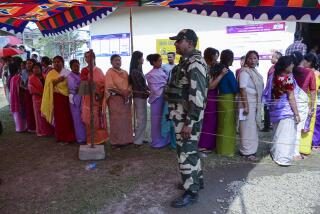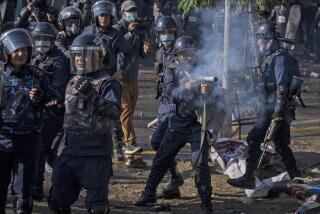Nepalese Stay Home in First Voting in 7 Years
- Share via
KATMANDU, Nepal — Initial results today showed pro-government candidates in Nepal sweeping local elections that were marred by rebel attacks, soldiers shooting protesters, low turnout and a boycott by most politicians to protest the king’s absolute rule.
The elections Wednesday, the first in seven years, were for the relatively powerless posts of mayor and local council member, and the dearth of voters at the polls was considered a more important indicator of popular sentiment than the election results themselves.
In initial returns for 15 of the 36 cities and towns where polls were held, the pro-government Rastriya Prajatantra Party won 10 mayoralties, the pro-government Nepal Sadbhawana won two and independent candidates won three, the Election Commission said.
Six people died in violence on election day, among them a protester shot by soldiers.
The United States called the election “a hollow attempt” by King Gyanendra to solidify power.
A coalition of the country’s seven main political parties boycotted the elections to protest the king’s power grab just over a year ago, when he said he needed to take the helm to bring the country’s Maoist insurgency under control. However, rebel attacks continued, and have intensified in recent weeks.
Many voters said they were scared away from the polls by Maoist threats to kill anyone who took part and a government warning it would shoot anyone caught disrupting the polling, as political dissidents had pledged to do.
In the southwestern town of Dang, the army said “soldiers were compelled to open fire” on about 150 protesters trying to interfere with the vote, killing one and injuring another.
Attempts to reach Dang by telephone to verify the army’s account were unsuccessful because phones there were not working. It was unclear why.
Chief Election Commissioner Keshav Raj Rajbhandari said turnout was estimated at more than 20%, but the final figure was still being tabulated.
The elections drew candidates for fewer than half the country’s 4,000 mayoral and local council seats. Twenty-two of the country’s municipalities held no voting because they either lacked candidates or had contenders running unopposed.
More to Read
Sign up for Essential California
The most important California stories and recommendations in your inbox every morning.
You may occasionally receive promotional content from the Los Angeles Times.













